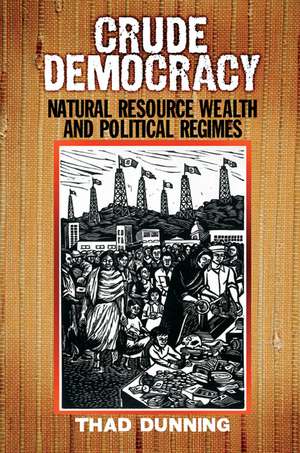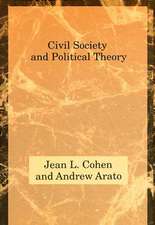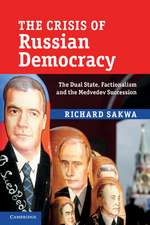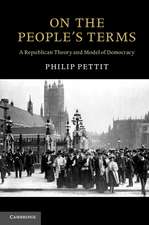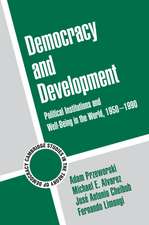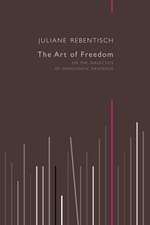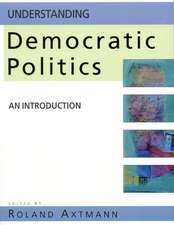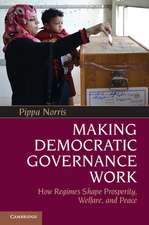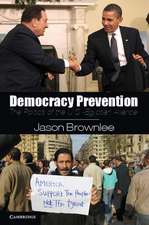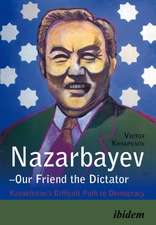Crude Democracy: Natural Resource Wealth and Political Regimes: Cambridge Studies in Comparative Politics
Autor Thad Dunningen Limba Engleză Paperback – 7 sep 2008
| Toate formatele și edițiile | Preț | Express |
|---|---|---|
| Paperback (1) | 289.78 lei 6-8 săpt. | |
| Cambridge University Press – 7 sep 2008 | 289.78 lei 6-8 săpt. | |
| Hardback (1) | 557.19 lei 6-8 săpt. | |
| Cambridge University Press – 7 sep 2008 | 557.19 lei 6-8 săpt. |
Din seria Cambridge Studies in Comparative Politics
-
 Preț: 179.15 lei
Preț: 179.15 lei -
 Preț: 267.61 lei
Preț: 267.61 lei -
 Preț: 239.36 lei
Preț: 239.36 lei - 9%
 Preț: 594.67 lei
Preț: 594.67 lei -
 Preț: 160.82 lei
Preț: 160.82 lei -
 Preț: 269.58 lei
Preț: 269.58 lei -
 Preț: 264.74 lei
Preț: 264.74 lei -
 Preț: 177.28 lei
Preț: 177.28 lei -
 Preț: 225.70 lei
Preț: 225.70 lei -
 Preț: 164.94 lei
Preț: 164.94 lei -
 Preț: 236.42 lei
Preț: 236.42 lei -
 Preț: 185.64 lei
Preț: 185.64 lei -
 Preț: 233.13 lei
Preț: 233.13 lei -
 Preț: 206.71 lei
Preț: 206.71 lei -
 Preț: 231.82 lei
Preț: 231.82 lei -
 Preț: 206.52 lei
Preț: 206.52 lei -
 Preț: 201.24 lei
Preț: 201.24 lei -
 Preț: 358.37 lei
Preț: 358.37 lei -
 Preț: 203.42 lei
Preț: 203.42 lei -
 Preț: 232.45 lei
Preț: 232.45 lei -
 Preț: 257.82 lei
Preț: 257.82 lei -
 Preț: 191.12 lei
Preț: 191.12 lei -
 Preț: 158.77 lei
Preț: 158.77 lei -
 Preț: 199.05 lei
Preț: 199.05 lei - 11%
 Preț: 553.80 lei
Preț: 553.80 lei - 11%
 Preț: 695.06 lei
Preț: 695.06 lei -
 Preț: 288.80 lei
Preț: 288.80 lei -
 Preț: 262.06 lei
Preț: 262.06 lei - 11%
 Preț: 691.66 lei
Preț: 691.66 lei -
 Preț: 388.29 lei
Preț: 388.29 lei -
 Preț: 288.04 lei
Preț: 288.04 lei -
 Preț: 228.00 lei
Preț: 228.00 lei -
 Preț: 385.28 lei
Preț: 385.28 lei -
 Preț: 312.89 lei
Preț: 312.89 lei -
 Preț: 224.44 lei
Preț: 224.44 lei -
 Preț: 287.07 lei
Preț: 287.07 lei -
 Preț: 251.27 lei
Preț: 251.27 lei -
 Preț: 313.70 lei
Preț: 313.70 lei -
 Preț: 277.38 lei
Preț: 277.38 lei -
 Preț: 423.79 lei
Preț: 423.79 lei - 11%
 Preț: 552.94 lei
Preț: 552.94 lei - 11%
 Preț: 554.43 lei
Preț: 554.43 lei - 14%
 Preț: 783.26 lei
Preț: 783.26 lei
Preț: 289.78 lei
Nou
Puncte Express: 435
Preț estimativ în valută:
55.48€ • 57.88$ • 46.50£
55.48€ • 57.88$ • 46.50£
Carte tipărită la comandă
Livrare economică 12-26 martie
Preluare comenzi: 021 569.72.76
Specificații
ISBN-13: 9780521730754
ISBN-10: 0521730759
Pagini: 350
Ilustrații: 7 tables
Dimensiuni: 152 x 229 x 20 mm
Greutate: 0.5 kg
Ediția:1
Editura: Cambridge University Press
Colecția Cambridge University Press
Seria Cambridge Studies in Comparative Politics
Locul publicării:New York, United States
ISBN-10: 0521730759
Pagini: 350
Ilustrații: 7 tables
Dimensiuni: 152 x 229 x 20 mm
Greutate: 0.5 kg
Ediția:1
Editura: Cambridge University Press
Colecția Cambridge University Press
Seria Cambridge Studies in Comparative Politics
Locul publicării:New York, United States
Cuprins
1. Does oil promote democracy?; 2. The foundations of rentier states; 3. Resource rents and the political regime; 4. Statistical tests on rents and the regime; 5. The democratic effect of rents; 6. Rentier democracy in comparative perspective; 7. Theoretical extensions; 8. Conclusion: whither the resource curse?
Recenzii
“Thad Dunning has produced an outstanding book, founded on a theoretically-sophisticated re-evaluation of the popular and academic consensus linking oil and resource wealth to political authoritarianism. By showing – both in game theoretic and empirical terms – how resource wealth can promote both democracy and authoritarianism, albeit through separate mechanisms, Dunning provides the first account that simultaneously explains the well-known cases of oil-based authoritarianism as well as the oft-overlooked resource-rich democracies. It is an analytical tour-de-force that will likely set the bar for future studies of resource politics, and through its innovative marriage of formal, statistical, and qualitative tools, for comparative politics more generally.”
-Marcus Kurtz, Ohio State University
“Is oil good or bad for democracy? Read this book and find out why the wrangling is over. Social science meets comparative politics, at last.”
-James Robinson, Harvard University
“This innovative book brings a new level of sophistication to the study of resource wealth and democracy. Dunning makes a compelling argument – using case studies, statistical analysis, and formal models – that resource dependence will have sharply different effects on governance, depending on a country’s prior level of inequality: where inequality is low, oil dependence may hinder democracy, but where it is high, oil dependence may foster democracy. This is a wonderfully nuanced analysis that will have a major impact on the field, and should be widely read.”
-Michael Ross, University of California, Los Angeles
“Crude Democracy shatters the widely-held view that natural resource wealth breeds authoritarianism. With a potent blend of in-depth fieldwork, formal models, statistical analysis, and small-N comparisons, Dunning carefully elucidates the contrasting political consequences of natural resources, showing that they can surprisingly have a democracy-promoting effect. The result is a work of first-class scholarship that anyone interested in development and democracy needs to read.”
-Richard Snyder, Brown University
-Marcus Kurtz, Ohio State University
“Is oil good or bad for democracy? Read this book and find out why the wrangling is over. Social science meets comparative politics, at last.”
-James Robinson, Harvard University
“This innovative book brings a new level of sophistication to the study of resource wealth and democracy. Dunning makes a compelling argument – using case studies, statistical analysis, and formal models – that resource dependence will have sharply different effects on governance, depending on a country’s prior level of inequality: where inequality is low, oil dependence may hinder democracy, but where it is high, oil dependence may foster democracy. This is a wonderfully nuanced analysis that will have a major impact on the field, and should be widely read.”
-Michael Ross, University of California, Los Angeles
“Crude Democracy shatters the widely-held view that natural resource wealth breeds authoritarianism. With a potent blend of in-depth fieldwork, formal models, statistical analysis, and small-N comparisons, Dunning carefully elucidates the contrasting political consequences of natural resources, showing that they can surprisingly have a democracy-promoting effect. The result is a work of first-class scholarship that anyone interested in development and democracy needs to read.”
-Richard Snyder, Brown University
Notă biografică
Descriere
This book challenges the conventional wisdom that natural resource wealth promotes autocracy.
